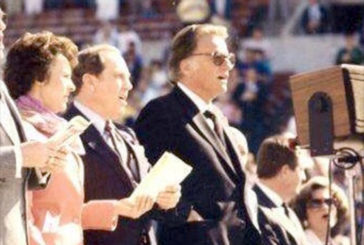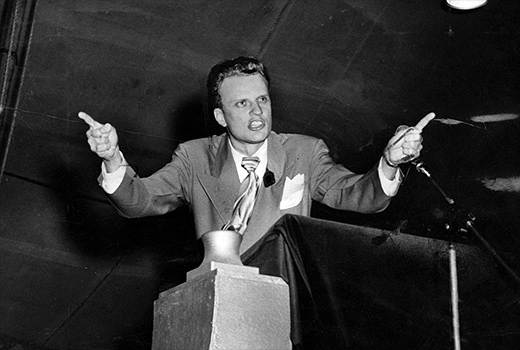The Beginnings
Dr. Graham grew up on a dairy farm outside of Charlotte, N.C. His childhood home was moved to where the Billy Graham Library now sits today. He gave his life to Christ at age 16 after hearing the evangelist Mordecai Ham preach, and at age 18 he received the call to preach. He graduated from Wheaton College in 1943 with a degree in anthropology. It was at Wheaton where he met the love of his life, Ruth Bell, whose parents were missionaries in China. Their marriage in 1943 produced five children, 19 grandchildren and numerous great-grandchildren.
Early Ministry
Dr. Graham’s first job was as a pastor in Illinois. While a pastor, he began his first radio program called “Songs in the Night.” In 1947, he was hired as the president of Northwestern Bible College and held his first crusade in Grand Rapids, Mich. His first tent revival meetings in Los Angeles in 1949 were where he gained the attention of the media. Since that first crusade, he has conducted over 400 events in 185 countries.
In 1950, he founded the Billy Graham Evangelistic Association (BGEA) with his lifelong ministry friends Bev Shea, Cliff Barrows and Grady Wilson. He also began advising presidents in the 1950s. As a man of prayer, he encouraged all politicians to guide this country by submitting to God’s will and His ways. He encouraged my father, Harry Dent, a presidential advisor, to start a prayer breakfast in the Nixon White House.
A Simple Life
At a time when many televangelists across our nation were living in luxury, Billy and Ruth maintained a simple, moderate lifestyle. In 1968, my family visited their quaint home nestled in Black Mountain, N.C. The Graham home was nothing more than an elegant log cabin. When I would hear someone criticize TV evangelists for their lavish lifestyles and include the Grahams, I was always quick to defend.

Harry Dent, with his wife, Betty, was a friend of Billy Graham and served as chairman of his 1987 crusade in Columbia, S.C.
As we were leaving, Dr. Graham led in prayer. He sensed my fear when his German shepherd approached me. He immediately paused from praying, gave a German command, and the dog obeyed. He held my hand to make sure I was all right, and then continued his prayer. Since that day I’ve always stood in awe of him.
BGEA co-founded the Evangelical Council for Financial Accountability and has practiced sound financial accountability to its donors. Dr. Graham’s salary was always modest compared to other television pastors. He never allowed his opportunities for prosperity to become a stumbling block to the gospel.
Dr. Graham’s consistent Christian life has served as his greatest asset. Although he could have amassed a fortune through book royalties and gifts, he donated all of his book proceeds to his ministry and the many valuable gifts he has received from dignitaries all over the world are showcased at The Billy Graham Training Center (The Cove) in Asheville, N.C.
Stance on Desegregation
Although he grew up a son of the Deep South, during the Civil Rights era he demanded integrated seating at his revivals — even tearing down ropes that divided the sections at one crusade. He proclaimed, “There is no scriptural basis for segregation.” He also stated, “The ground at the foot of the cross is level.”
In 1957, he developed a friendship with Martin Luther King Jr. and invited him to preach at a revival with him in New York City. Ebony Magazine reported that Martin Luther King stated at a conference in Rio de Janeiro in 1960: “Had it not been for the ministry of my good friend Dr. Billy Graham, my own work in the civil rights movement would not have been successful as it has been.”
King and Graham were united on the issue of civil rights for all people. Dr. Graham always made sure his crusades had access for those who were disabled in wheelchairs and interpreters for those who were deaf. When President Nixon and my father were trying to bring about the integration of schools in the South, Dr. Graham was featured in video messages encouraging order and support for public education.
On one occasion, Billy Graham refused to host a crusade in South Africa until the government allowed integrated seating. When he finally held his first crusade there in 1973, he spoke against apartheid. He also corresponded with Nelson Mandela while he was imprisoned. Graham insisted, “Christianity is not a white man’s religion … Christ belongs to all people … There is no color line in heaven.”
Stance on Marriage
Although Dr. Graham rarely got involved politically, his advice and friendship were offered to any president. Grieved as he was to see our nation rapidly slipping away from our Judeo-Christian values, he boldly placed ads, with his picture, encouraging Christians to “vote for biblical values.” He defined those values as supporting Israel, protecting the sanctity of human life, and supporting the biblical definition of marriage between a man and a woman.
Although criticized by some for his efforts, he was perfectly within his role as a pastor. He was advising them on how to vote, rather than whom to vote for. He did not endorse any candidates. Bill Federer, a renowned historian, says, “It is the job of the church (pastors) to teach biblical values and provide a moral populous to reflect the moral view of the people.”
Stance on Communism
Dr. Graham was known for his disdain for communism. When the door opened to one of those countries, he did not hesitate to launch crusades and boldly tell communist leaders that their people needed freedom of religion. Some Romanians feel his visit in 1987 was a catalyst for the fall of communism. Romanians, hungry to hear his preaching, lined the streets, hoping to hear his words flowing from outside the cathedral walls.
Awards and Honors
Dr. Graham has written 31 bestselling books and has received 20 honorary doctorates. He has received numerous honors such as the Templeton Foundation Prize for Progress in Religion, the Ronald Reagan Freedom Award, the Presidential Medal of Freedom, and the Congressional Gold Medal Award. His name appears on two highways, as an endowed chair at Samford University, as a division of Southern Seminary, and on the Billy Graham Center at Wheaton College where his archives are housed.
On May 31, 2007, the Billy Graham Library was officially dedicated in Charlotte, N.C. My mother, Betty Dent, and I attended the rededication in April of 2010, when Thomas Kincaid’s mural of “The Cross” was unveiled. The entire complex is extraordinary, and the walk-through museum is like a virtual crusade directing visitors to the cross.
His greatest accomplishment is that 3.2 million have responded to his invitation to receive Christ. My father, Harry Dent, chaired two of those crusades and was highly impressed with the entire BGEA team, who worked before and after the crusade to coordinate with churches to meet the needs of the many who responded.
His Final Sermon
He was known to say, “I’ll preach until there’s no breath left in my body.” In April of 2013, he kicked off “My Hope with Billy Graham,” which encouraged church members to spread the gospel in small groups using his last message in a video called “The Cross.” This video was aired nationwide by several channels, including Fox News, during his 95th birthday week. His final public appearance was on his 95th birthday celebration at the Grove Park Inn in Asheville, N.C, which was attended by Christian leaders nationwide. The celebration’s purpose was to ignite a spiritual revival.
His Honest Regrets
Dr. Graham did not shy away from mentioning his greatest regret — wishing he had spent more time with his family as his children were growing up. Gone for six months at a time, his family made a huge sacrifice. Maybe that’s why when Ruth Graham was asked, “Have you ever thought about divorce?” she responded, “I’ve never thought about divorce in all these 35 years of marriage, but I did think of murder a few times.”
The time he did spend with his family must have been profitable, as four of Graham’s children (and some grandchildren) have followed in his footsteps to serve in ministry. His daughter Ruth described her father as a “a softie at heart who loved spending time with his children.” His son Franklin now runs the BGEA along with his own ministry, Samaritan’s Purse.
In an interview with Christianity Today, Billy Graham also wished he had “prayed and studied more” and “regrets the times he did not steer away from politics.” He admits “at times he crossed the line.” In that interview given in January of 2011, Dr. Graham warned: “The critical issues of our time aren’t economic or political or social, they are moral and spiritual in nature. May we never forget that our calling is to declare Christ’s forgiveness and hope and transforming power to a world that does not know Him.”
“About one thing I have absolutely no regrets, however,” Billy said, “and that is my commitment many years ago to accept God’s calling to serve Him as an evangelist of the Gospel of Christ.”
— Ginny Dent Brant, of Clemson, is a writer and speaker who grew up in the halls of power in Washington, D.C. Her book about her spiritual journey with her father, Harry S. Dent Sr., “Finding True Freedom: From the White House to the World,” was released in 2010. This article first appeared at sonomachristianhome.com.
